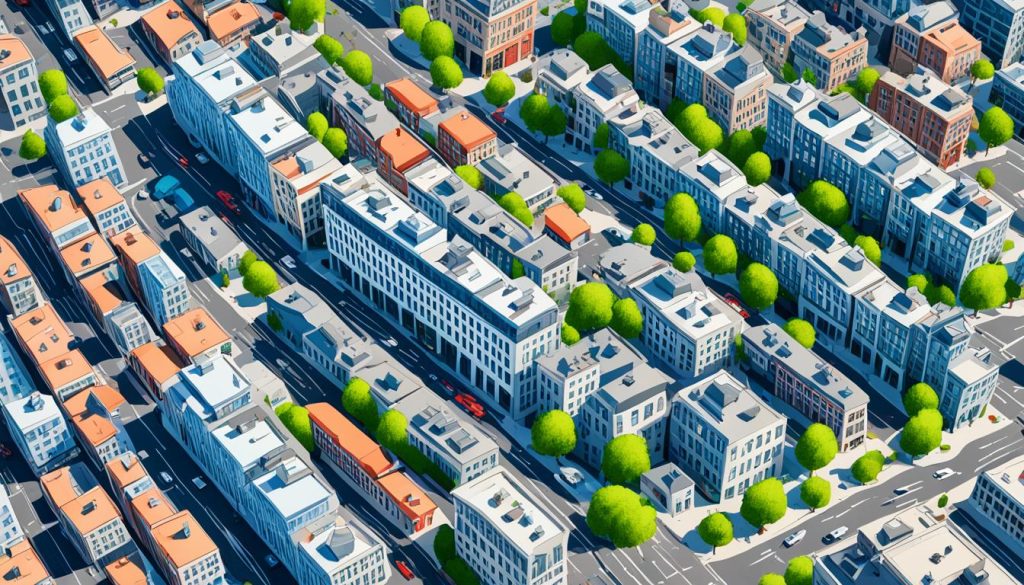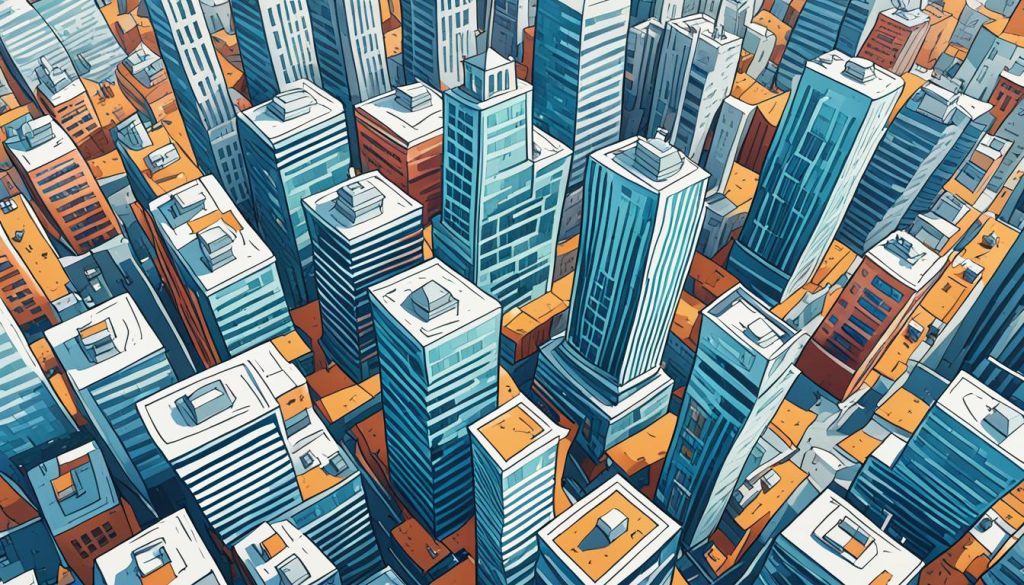You can make your aerial architectural photos look perfect with AI perspective correction. This tech uses advanced image processing to fix and improve your shots. It helps you take amazing photos of buildings from above.
AI tools use machine learning and computer vision to solve aerial photography problems. These tools fix distortions, make compositions better, and make your architectural photos look more appealing.
Drone photography has changed how we see buildings from above. But, it has its challenges. AI perspective correction helps fix problems like scale issues and environmental effects. This makes your photos more accurate and beautiful.
Understanding Aerial Architectural Photography
Aerial architectural photography has changed how we see buildings. Drones let architects and photographers capture structures from new angles. These views were hard to get before.
Challenges of Aerial Photography
Getting great aerial shots is tough. Image distortion is a big problem, especially with tall buildings or wide-angle lenses. The weather and airspace rules can also stop you from getting the shot you want. Plus, flying a drone and keeping your shot in focus is hard.
Importance of Perspective in Architectural Shots
Getting the perspective right is key in showing buildings. It shows their size, shape, and how they fit together. Making sure lines stay straight and true is important for art and technical use.
Traditional Methods vs. AI-Powered Solutions
Before, photographers used special lenses or editing to fix perspective. This took a lot of skill and time. Now, AI helps fix these problems automatically. These tools look at images, find distortions, and fix them quickly. This makes taking aerial photos easier and faster.
| Aspect | Traditional Methods | AI-Powered Solutions |
|---|---|---|
| Time required | Hours of manual work | Minutes with automation |
| Skill level needed | High expertise | Beginner-friendly |
| Consistency | Varies with user skill | Highly consistent results |
| Adaptability | Limited to user knowledge | Learns from diverse datasets |
The Role of AI in Modern Photography
AI changes photography by making hard tasks easier and improving image quality. In architectural photography, it’s key for fixing perspective, analyzing images, and making 3D models. Machine learning looks at lots of architectural photos to spot patterns and fix issues.
Computer vision lets AI understand what it sees in photos. This means it can automatically fix problems in aerial shots of buildings. This tech helps photographers spend more time on creativity and less on fixing technical issues.
AI in image processing does more than just tweak settings. It can remove things you don’t want, make details clearer, and even fill in missing parts of buildings. This level of detail was hard to achieve before AI came along.
AI-Powered Tools for Architectural Photography
Photogrammetry and machine learning work together to make detailed 3D models from 2D photos. This is super useful for architects and city planners who need accurate building and landscape models. AI can make these models quickly and accurately, better than ever before.
| AI Application | Benefit | Technology Used |
|---|---|---|
| Perspective Correction | Eliminates distortion in aerial shots | Computer Vision |
| Image Enhancement | Improves clarity and detail | Machine Learning |
| 3D Modeling | Creates accurate architectural representations | Photogrammetry |
| Object Removal | Cleans up unwanted elements | Image Processing |
By using these AI tools, photographers can make amazing aerial shots of buildings with ease and quality. AI in photography is changing what we can do with images, making them better and more detailed.
How AI Perspective Correction Works
AI perspective correction changes the game in aerial photography. It uses deep learning to make images look better. Neural networks help by analyzing and fixing images with great accuracy.
Machine Learning Algorithms
AI perspective correction relies on smart machine learning algorithms. These algorithms learn from lots of architectural photos. They can spot and fix wrong perspectives on their own.
Thanks to deep learning, the system knows what to look for in buildings. It makes the right changes to fix the image.
Image Analysis and Processing
The first step in image analysis is to break the photo into parts. This helps the AI see what makes up the building.
- Image segmentation to identify distinct architectural features
- Feature extraction to analyze lines, angles, and shapes
- Spatial data analysis to understand the relationships between objects
This way, the AI gets a full picture of the photo’s layout and details.
Automated Adjustments
After analyzing the image, the AI makes changes to make it perfect. These changes include:
| Adjustment Type | Description | Impact |
|---|---|---|
| Line Straightening | Corrects vertical and horizontal lines | Improves overall perception of structure |
| Angle Correction | Adjusts angles to match real-world geometry | Enhances architectural accuracy |
| Composition Optimization | Refines image framing and balance | Creates more visually appealing results |
By using these smart methods, AI perspective correction makes aerial photos look amazing. It gives professional-quality results with little help from humans.
Benefits of Using AI for Perspective Correction
AI perspective correction offers big advantages for aerial architectural photography. It makes your workflow and final images better in many ways.

One big plus is accuracy improvement. AI cuts out human mistakes and personal opinions, making sure your aerial shots are just right. This means your work always looks top-notch.
Another big plus is saving time. AI does complex perspective fixes automatically, which would take hours by hand. This lets you spend more time on being creative.
Getting consistent looks in many images is easy with AI. It keeps your architectural photos looking the same, telling a clear story with your pictures.
Seeing things more clearly is a huge benefit. AI makes sure the composition and highlights important parts of buildings, making your photos stand out. They really show what makes each building special.
| Benefit | Impact on Workflow | Impact on Final Images |
|---|---|---|
| Accuracy Improvement | Reduces need for manual corrections | Precise, professional-looking results |
| Time-saving | Speeds up post-processing | Quicker turnaround for clients |
| Consistency | Streamlines editing of multiple shots | Unified look across photo series |
| Enhanced Visualization | Simplifies composition adjustments | More impactful, visually appealing images |
Using these AI benefits can take your aerial architectural photography to the next level. You’ll get amazing results faster and more efficiently.
Choosing the Right AI Tools for Perspective Correction
Finding the right AI software for fixing perspective in aerial photos is tough. There are many image editing tools out there. It’s important to pick one that fits your needs and works well with your workflow.
Popular Software Options
Many AI tools are popular among architectural photographers:
- Adobe Photoshop: Offers advanced AI features for perspective correction
- DxO ViewPoint: Specializes in automatic distortion correction
- Skylum Luminar AI: Provides intelligent sky replacement and perspective adjustments
Key Features to Look For
Look for these key features in architectural rendering software:
- Automatic distortion correction
- Vanishing point adjustment
- Batch processing capabilities
- AI-powered sky replacement
- Lens profile corrections
Compatibility with Your Workflow
Make sure the AI software fits your workflow. Think about file format compatibility, plugin support, and how easy it is to use. Some tools are standalone apps, while others work as plugins for well-known image editing software.
By looking at these factors, you can pick AI tools that improve your aerial architectural photos without messing up your workflow.
Use AI Perspective Correction to Perfect Aerial Architectural Photos
Aerial imaging has changed how we see buildings and landscapes. To get amazing shots, learn drone photography and use AI editing tools. Let’s see how AI can improve your aerial architectural photos.

Begin by taking high-quality raw images with your drone. Capture the building from different angles. Always shoot in RAW to keep as much detail as possible for editing later.
Then, put your photos into an AI editing software. These tools look at your pictures and fix any wrong perspective. They make lines straight, adjust angles, and improve the look of your photo.
AI is great at spotting architectural details and fixing them. It can fix problems like lines that seem to meet in the middle, which happens a lot with tall buildings. This makes editing much easier than doing it by hand.
Once the AI has worked its magic, check the photos closely. Make any changes you need, focusing on details and how the photo looks overall. You might want to highlight certain parts or keep a specific look in mind.
| Step | Action | Benefit |
|---|---|---|
| 1 | Capture RAW images | Preserve detail for editing |
| 2 | Use AI software | Automatic perspective correction |
| 3 | Review and fine-tune | Ensure artistic vision |
| 4 | Experiment with settings | Achieve desired balance |
Try out different AI settings to get the right mix of accuracy and art. This way, you can make aerial architectural photos that really show off buildings in their best light.
Step-by-Step Guide to Implementing AI Perspective Correction
AI perspective correction changes how we take architectural photos. This guide will help you make your photo editing faster and better. Let’s explore how AI can improve your aerial architectural photos.
- Import raw aerial images into your AI-powered software
- Apply automatic perspective correction
- Fine-tune adjustments for specific architectural elements
- Review and manually refine corrections if needed
- Apply additional enhancements like color correction
- Export the final image for architectural visualization
Begin by adding your aerial images to your AI software. This step is key for keeping your images clear during editing. Then, use the automatic perspective correction feature. The AI looks at the image, finds important lines and shapes, and fixes the perspective.
Next, adjust the AI’s changes for certain parts of the building. Pay attention to vertical lines, horizontal planes, and symmetry. This makes sure each building looks its best.
Check the AI’s work and tweak it if needed. Even with AI, your eye for art is crucial. Once you’re happy with the perspective, add more touches like color correction or sharpening. This makes your architectural photo stand out.
Finally, save your work in the format you need, like for showing off or presenting. Using AI perspective correction in your editing makes your architectural photos look amazing.
Common Mistakes to Avoid When Using AI Perspective Correction
AI perspective correction can change your aerial architectural photos for the better. But, it’s important to know the common mistakes to avoid. This way, your images will look great and capture the beauty of the architecture.
Over-Reliance on Automation
AI is very powerful, but it’s not perfect. Sometimes, complex architectural details can confuse even the smartest algorithms. Remember, AI is meant to help your photography skills, not take over. Always use your artistic judgment with AI to get the best results.
Ignoring Original Composition
Your first shot is important. Don’t let AI change your creative vision. Use AI to improve, not change, your original shot. This keeps the unique look of the architecture you’re capturing.
Neglecting Manual Fine-Tuning
AI’s results aren’t always perfect. Always check and tweak the AI’s work. This ensures your final image shows the building’s true form and your artistic vision.






